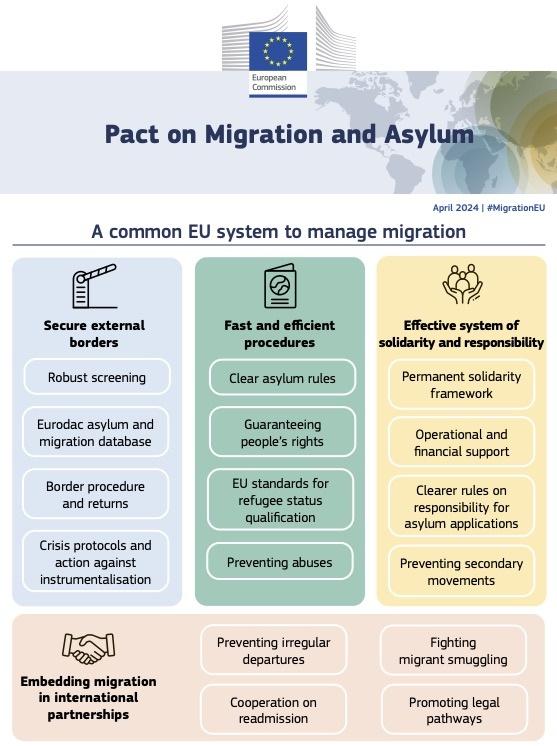The EU's Policies And The Rise Of European Emigration

Table of Contents
Economic Policies and European Emigration
High unemployment rates, particularly among young people, and the implementation of austerity measures have significantly contributed to the rise in European emigration. These economic factors force many skilled individuals to seek opportunities abroad, leading to a concerning "brain drain" effect.
Youth Unemployment and Brain Drain
High youth unemployment, especially prevalent in Southern European countries, is a major driver of European emigration. Young, skilled individuals, facing bleak job prospects at home, are increasingly seeking employment and better living standards elsewhere in the EU or globally.
- Lack of job creation in specific sectors: A mismatch between available jobs and the skills of young graduates contributes to high unemployment.
- Insufficient investment in education and skills development: A lack of investment in vocational training and higher education leaves many young people ill-equipped for the demands of the modern job market.
- Limited access to affordable housing: Soaring housing costs, particularly in urban areas, make it difficult for young people to establish themselves financially, pushing them to seek opportunities with more affordable living situations elsewhere.
- High levels of graduate unemployment: A significant number of university graduates face unemployment, highlighting systemic issues within the EU's education and employment systems. This contributes heavily to the brain drain as highly educated individuals seek better prospects outside the EU.
Austerity Measures and Reduced Social Welfare
Austerity measures implemented in response to the 2008 financial crisis and subsequent economic downturns have had a significant impact on social welfare systems across the EU. Reduced benefits and cuts in public services have negatively impacted the quality of life, encouraging emigration among those seeking better social safety nets.
- Reductions in healthcare and education funding: Cuts to healthcare and education have diminished access to vital services, impacting the well-being of citizens and reducing their overall quality of life.
- Decreased unemployment benefits: Reduced unemployment benefits leave those without jobs facing financial hardship, pushing some to emigrate in search of better support systems.
- Pension reforms impacting retirement security: Changes to pension systems have raised concerns about retirement security, leading some individuals to seek better retirement provisions in other countries.
- Increased income inequality: Austerity measures have often disproportionately affected lower-income households, leading to increased income inequality and driving emigration among those seeking greater economic opportunities.
Immigration Policies and Their Paradoxical Effect on Emigration
Ironically, restrictive immigration policies within the EU, designed to control inward migration, can inadvertently create a climate that encourages emigration of EU citizens. The perceived climate of exclusion and the bureaucratic hurdles faced by non-EU citizens can indirectly impact the willingness of EU citizens to remain.
Restrictive Immigration Policies
Stricter immigration policies, while aimed at managing immigration flows, can create a less welcoming atmosphere and contribute to a sense of exclusion amongst some segments of the population. This can lead some EU citizens to question their own future within the bloc.
- Increased bureaucratic hurdles for non-EU citizens: Complex and lengthy processes for non-EU citizens to obtain visas and residency permits can create a sense of unfairness and discourage integration.
- Restrictions on family reunification: Limitations on family reunification can create hardship for families and may lead to individuals seeking opportunities abroad where family reunification is easier.
- Negative perception of immigrants among some segments of the population: Xenophobic attitudes and anti-immigrant sentiment, sometimes fueled by political discourse, can create an unwelcoming environment for all residents, including EU citizens.
- Potential for discrimination and xenophobia: Instances of discrimination and xenophobia can dissuade individuals from staying, especially if they belong to minority groups who feel increasingly marginalized.
Free Movement Restrictions and Brexit
Brexit has highlighted the importance of free movement within the EU and the potential consequences of restrictions. The uncertainty surrounding the future status of EU citizens in the UK after Brexit, and the reciprocal impact on UK citizens in the EU, has spurred emigration in both directions, highlighting the negative effects of limiting free movement.
- Loss of economic opportunities for EU citizens in the UK: Brexit has introduced new barriers to work and live in the UK, leading some EU citizens to seek employment elsewhere.
- Uncertainty surrounding future residency rights: The complexities and uncertainties surrounding residency rights for EU citizens in the UK post-Brexit have understandably driven emigration.
- Increased barriers to cross-border employment: The introduction of new visa requirements and restrictions on cross-border work has made it more difficult for individuals to maintain employment across borders.
- Potential for a decline in cross-border collaborations: Restrictions on movement could lead to a reduction in cross-border collaborations and knowledge exchange between EU countries.
Political Factors Influencing European Emigration
Political factors, including the rise of populism and nationalism, and a growing sense of disillusionment with EU institutions, have also influenced European emigration. Feeling unrepresented or facing intolerance can significantly impact a citizen's decision to emigrate.
Rise of Populism and Nationalism
The rise of populist and nationalist movements in several EU countries has created an atmosphere of uncertainty and intolerance. This has led some citizens to seek refuge in more tolerant and stable environments elsewhere.
- Increased political instability: The rise of populist movements often leads to political instability, making some citizens feel insecure about their future within their own countries.
- Erosion of democratic institutions: Populist movements often challenge democratic norms and institutions, eroding trust in government and potentially creating a climate where emigration becomes more attractive.
- Spread of misinformation and hate speech: The spread of misinformation and hate speech, often amplified by social media, contributes to a climate of intolerance and fear, making emigration seem like a necessary escape for those targeted.
- Growing social divisions: Populist rhetoric often exacerbates existing social divisions, further destabilizing the social fabric and prompting emigration amongst those feeling marginalized or threatened.
Lack of Political Representation and Disillusionment
A widespread sense of disillusionment with EU institutions and a lack of political representation can also drive emigration. Many citizens feel their concerns are not being adequately addressed, leading them to seek opportunities elsewhere.
- Sense of political marginalization: Many citizens feel their voices are not being heard at the national or EU level, leading to feelings of powerlessness and prompting them to leave.
- Lack of trust in political institutions: A declining level of trust in political institutions can be a significant factor influencing emigration, as individuals may feel the system is not working for them.
- Perceived ineffectiveness of EU policies: The perceived ineffectiveness of some EU policies in addressing specific concerns can increase disillusionment and motivate emigration.
- Desire for greater political autonomy: Some individuals may seek emigration in order to live in countries with political systems they perceive to be more aligned with their values.
Conclusion
The rise of European emigration is a complex issue intricately linked to a variety of EU policies. Economic hardship, restrictive immigration policies, political instability, and feelings of disillusionment all play a part. Understanding these intertwined factors is crucial for creating effective strategies to curb European emigration and retain skilled workers and citizens within the EU. Further in-depth research is needed to understand how specific EU policies affect various demographics and regions. Addressing the root causes of European emigration requires a holistic approach encompassing economic reforms, strengthened social safety nets, and a steadfast commitment to inclusive and democratic governance. Only through such a comprehensive strategy can the EU effectively mitigate the trend of European emigration and foster a more resilient and prosperous future. Investing in policies that support young people, strengthen social welfare, and promote a more inclusive and just society is vital to combatting European emigration and ensuring a thriving future for all.

Featured Posts
-
 Mets Missed Call Leads To Walk Off Loss A Costly Misplay
May 19, 2025
Mets Missed Call Leads To Walk Off Loss A Costly Misplay
May 19, 2025 -
 Elecciones Correismo Rechaza Restriccion Del Uso De Celulares
May 19, 2025
Elecciones Correismo Rechaza Restriccion Del Uso De Celulares
May 19, 2025 -
 Mississippi Broadband Leadership De Soto Countys 100 Connectivity Milestone
May 19, 2025
Mississippi Broadband Leadership De Soto Countys 100 Connectivity Milestone
May 19, 2025 -
 Azzi Fudds Stunning Red Carpet Look 2025 Wnba Draft On Espn
May 19, 2025
Azzi Fudds Stunning Red Carpet Look 2025 Wnba Draft On Espn
May 19, 2025 -
 277 Mph Bugatti Erling Haalands Lavish New Purchase
May 19, 2025
277 Mph Bugatti Erling Haalands Lavish New Purchase
May 19, 2025
